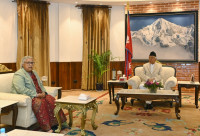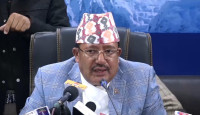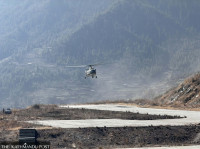National
The good, bad and ugly of Yubaraj Khatiwada
When appointed finance minister two-and-a-half-years ago, the technocrat brought with him the expertise to take the economy forward. But as he signed off, many say he just had a run-of-the-mill tenure.
Prithvi Man Shrestha
Despite his desire to continue Yubaraj Khaitwada as the finance minister, Prime Minister KP Sharma Oli, under pressure amid the fluid internal dynamics in his Nepal Communist Party, had to bid farewell to the technocrat.
Oli had handed over one of the key ministries to Khatiwada on February 26, 2018, in a move that earned praises for him, for the technocrat minister had an illustrious background–he holds a PhD in monetary economics, he served twice in the National Planning Commission as vice-chair and once as governor of the Nepal Rastra Bank.
Khatiwada was believed to be Oli’s charioteer–who could drive the government’s “prosperous Nepal, happy Nepali” campaign in the right direction.
Economist Govinda Nepal, a former member of National Planning Commission, said Khatiwada’s performance as the finance minister was neither great nor poor.
“During his tenure, the government received a significant amount of foreign aid. There can be a debate whether foreign aid is good or bad, but he managed to get it,” Nepal told the Post. “He was also able to generate enough resources for under-construction projects.”
According to Nepal, he should also be lauded for his effort to control tax evasion by introducing a policy of recognising only those transaction details submitted to the tax authority while applying for bank loans.
Khaitwada, therefore, could never earn the trust of the private sector, Nepal said.
“He faces charges of not being accommodative, as any other finance minister with a political background could have been,” said Nepal.
In the initial days of Khatiwada’s appointment as the finance minister, there certainly were high hopes all around, as he is known as a person well-versed on economy, finance and development issues, according to businesspersons and economists. His past experience as governor and vice-chair of the planning commission meant he knew the sources of ills that mired the country’s economy in stagnation.
However, the first criticism he faced was when he brought the white paper on Nepal’s economy, even when the fiscal budget was just round the corner. While painting a bleak picture of the country’s economy, he blamed the past governments for the fiascos.
But he himself failed to do anything substantial to give an impetus to the economy, according to a former administrator who did not want to be named.
“He failed to earn the trust of the market, particularly of the private sector and foreign investors,” said a former government official with a long experience in finance, economy and revenue issues. “He was reluctant to heed the private sector’s concerns, even refusing to meet them on many occasions.”
Khatiwada’s contempt for the private sector was well known, and his penchant for imposing state control had left businesspersons worried.
Many saw Khatiwada as a rigid bureaucrat, who would not give two hoots about the economic concerns of the private sector, and in the meantime, as also someone who would not hesitate to favour certain individuals or businesspersons.
The third budget he presented on May 28 this year especially ran into controversy for some of his policies, and among them, at least two starkly stand out.
He increased tax on electric vehicles up to 80 percent, inviting massive criticism from environmentalists.
Another issue was related to the tax on chocolates.
Critics say the move to reduce customs on chocolates was aimed at benefiting certain firms.
Khatiwada even tried to defend the decision at the House of Representatives, saying his decision to limit the customs rate on chocolates to 30 percent was not “not influenced by anyone”.
Khatiwada was also known as a strict taxman.
From the early months of his appointment, he started to instruct customs officials to increase the valuation of imported goods, which businessmen say was against the principle of valuation of the GATS principles as provisioned in the Customs Act.
“Yes, he gradually made his name more as a taxman rather than a finance minister in his little over two years of tenure,” said an industrialist. “His increasing focus on tax had left many spooked.”
According to the industrialist, he instructed officials not to recognise the invoice price. The valuation of the reference price maintained by customs offices to ensure that the importers don’t undervalue the imported goods to pay less tax. This is one of the reasons why book importers stopped importing books that had price tags in US dollars.
Despite severe criticism Khatiwada was facing after the latest budget, Oli was for giving continuation to him, as he was expecting Khatiwada to use his good office to bring in investment and aid, which are needed the most in the wake of the pandemic.
Working in the capacity of the central bank governor and vice-chair of the planning commission, Khatiwada had built a good rapport with donor agencies like the World Bank and Asian Development Bank.
“It’s true that he has good relations with the donors,” said the former government official. “He was able to bring good foreign aid, particularly from the World Bank during his tenure.”
A former finance minister described Khatiwada’s appointment as the finance minister as all sizzle and no steak.
“As a professional on economic issues, there were high hopes that the economy would take a leap under his leadership,” said Ram Sharan Mahat, a six-time finance minister who is known for introducing economic liberalisation in Nepal in the early 1990s. “But he made tall promises. There was no way the government could have implemented them.”
Mahat, a Nepali Congress leader, took umbrage at Khatiwada’s attempt to discredit the past government [led by Congress party] when he issued the white paper, days after assuming office..
“The administrative expenditure has increased massively while capital expenditure has been just 23-24 percent,” said Mahat. “He wrongly boasted about the current government’s performance in the current fiscal years’ budget.”
One criticism Khatiwada faced was data manipulation and multiple people familiar with him the Post talked to said he has that uncanny art.
Last year, the Financial Comptroller General Office showed a sudden rise in capital expenditure at the end of the fiscal year 2018-19 after a week-long disruption on its website.
“Forget the general public, even officials did not have access to revenue and expenditure data,” an official from the Financial Comptroller General Office had told the Post.
After revising the revenue and expenditure targets, the Finance Ministry had started to show progress based on the revised targets to show good progress in revenue and expenditure.
“Data manipulation began with the white paper [that he issued] which continued later as well,” said the ex-administrator.
One of the criticisms Khatiwada will continue to face for a long time is his contempt for the private sector, which is considered the engine for economic growth.
“He was known as a person who is not friendly to the private sector since he was the central bank governor,” said the industrialist. “And he behaved the same way with the private sector even after becoming the finance minister.”
The private sector had one particular gripe about Khatiwada that he painted all the businesses with the same brush in the name of taking a tough approach against revenue leakages and illicit business practices.
According to the industrialist, as someone who has a long experience as vice-chair of the planning commission and governor of the central bank, he should have known that all private sector entities are not fraudsters.
As an expert, there were high hopes from him, according to Pashupati Murarka, former president of the Federation of Nepalese Chambers of Commerce and Industry. “But he failed to deliver as per expectation,” said Murarka. “We are disappointed with him particularly for his failure to introduce a fiscal policy to support the small businesses during this pandemic.”
According to those who have followed Khatiwada’s policies and actions, over the last two years or so, it looked like he was confused whether to act as an economist or a politician.
“Despite signing the agreement, he chose to remain mum on the United State’s Millennium Challenge Corporation Nepal Compact,” said the former bureaucrat. “Since the agreement had been signed, shouldn't he have defended the agreement?”
The MCC has become a divisive force in the Nepal Communist Party and Khatiwada, according to the former bureaucrat, played safe, as he did not want to annoy his political masters.
The private sector, however, sees Khatiwada as someone who failed to introduce any long-term reform moves for business entities, even though he had the opportunity.
“He did not make any big policy departure to support economic transformation,” said Murarka. “However, he did not do much harm to businesses.”




 12.81°C Kathmandu
12.81°C Kathmandu















